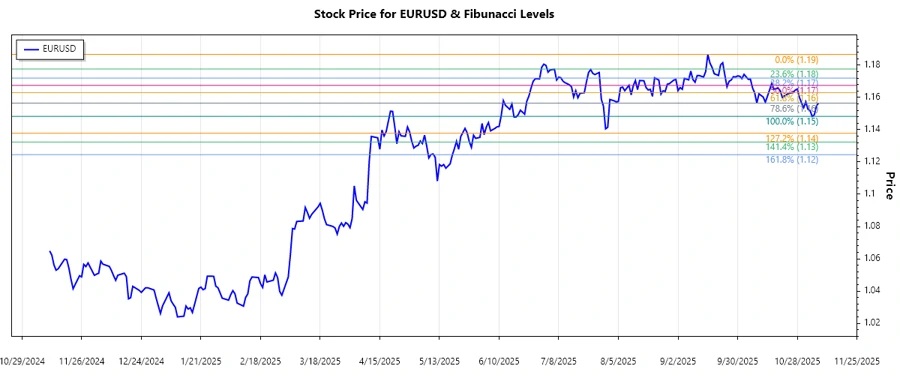November 09, 2025 a 05:08 am


EURUSD: Fibonacci Analysis

The EURUSD exchange rate has seen fluctuations in the past months, showcasing both potential upward and downward movements. The recent data reveals a downward trend, making it crucial to evaluate possible retracement levels for traders and investors. Understanding these patterns can provide insights into future support and resistance levels. It's important to analyze the current position within these retracement zones for potential trade setups.
Fibonacci Analysis
Based on the recent downtrend of EURUSD, we have identified key Fibonacci levels to consider. The analysis highlights the trend from the high on 2025-09-16 (1.18668) to the low on 2025-11-07 (1.14826). The table below details the Fibonacci retracement levels and analyzes the current price position in relation to these levels.
| Start Date | End Date | High Date | High Price | Low Date | Low Price | Current Price |
|---|---|---|---|---|---|---|
| 2025-09-16 | 2025-11-07 | 2025-09-16 | 1.18668 | 2025-11-07 | 1.14826 | 1.15664 |
| Fibonacci Level | Price Level |
|---|---|
| 0.236 | 1.15724 |
| 0.382 | 1.16410 |
| 0.5 | 1.16747 |
| 0.618 | 1.17084 |
| 0.786 | 1.17622 |
The current price of 1.15664 suggests that it is near the 0.236 retracement level. This could indicate a potential support area if the price manages to hold above this level.
Technical interpretation suggests that breaking below this level may lead to further downward pressure, while holding or bouncing back could see prices testing higher retracement levels, indicating possible resistance areas.

Conclusion
The EURUSD exchange rate appears to be in a corrective phase, following a pronounced downtrend. The proximity to the 0.236 Fibonacci level indicates a crucial support point that traders should watch closely. Should the EURUSD break below this level, it could signal further bearish momentum. Alternatively, a bounce might send the pair to test higher retracement levels. Analysts should be alert to these movements, as they present both opportunities and challenges in the evolving foreign exchange landscape. The importance of strategic entry and exit points cannot be overstated in such potentially volatile conditions.
